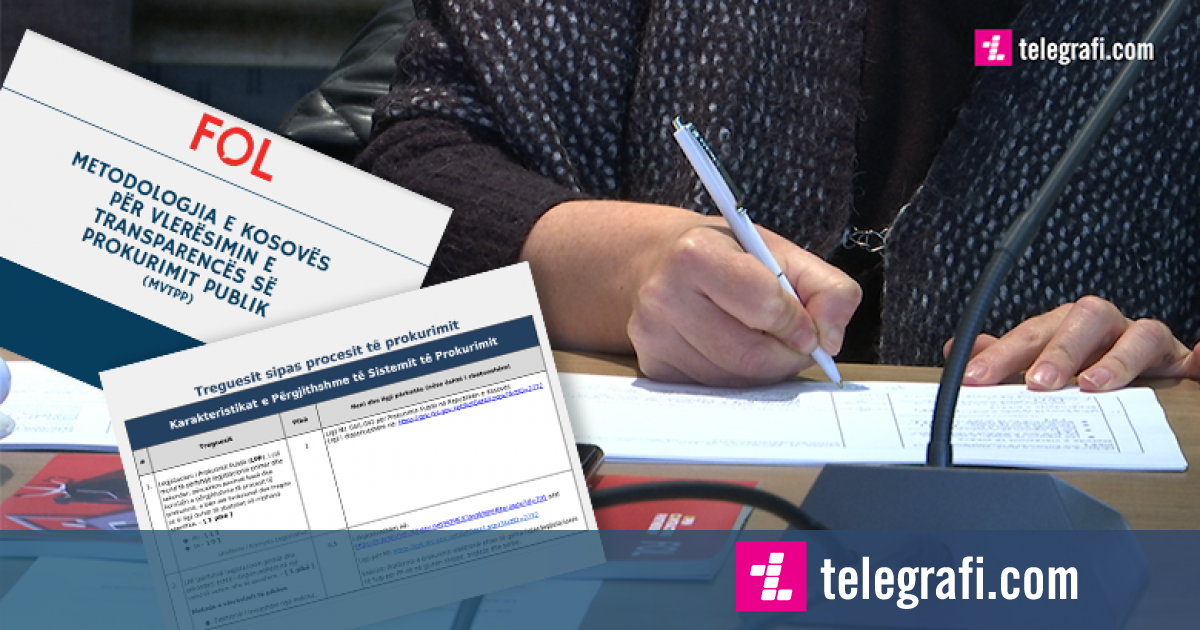Despite high evaluations regarding the transparency of Public Procurement, Kosovo has stagnation in the first and after the tendering phase.
This is the assessment of the latest report "Public Procurement Transparency Assessment (TRPP)", presented by the FOL Movement.
According to the researcher, Yllka Buzhala, this report has evaluated the legislation, not the practical part of procurement.
"We are the country that has joined this international initiative, so we are the 42nd country.
This means that only the evaluation of Kosovo legislation, whether laws or secondary, has been done.
Regarding public procurement, therefore, no evaluation has been made of the practical part of the implementation of this Law, but it has been measured through some indicators how transparent and how much it promotes competition and the like ", said Buzhala for Telegraf.
She emphasizes that Kosovo is estimated with 83 percent of the 42 participating countries, adding that these recommendations will be coordinated in the new Public Procurement Law.
"Kosovo is estimated at up to 83 percent, which means that it is in a good place.
"As far as the Balkan countries are concerned, it is Kosovo and Albania", she emphasizes.
"In terms of the legislative aspect, but why we decided to make such an assessment, why we decided to evaluate these methodology indicators is the reason that we are in the drafting stage of the Law on Public Procurement.
It is already over, it will be on the government agenda sometime in June this year.
"During the public consultation process, using these recommendations, in a way, we coordinate them for the draft of the new legislation", she adds.
Yllka Buzhala, researcher at Lëvizja FOL
Buzhala says that Kosovo in terms of transparency is estimated at 56 percent.
"Despite the fact that we have done well in evaluating the various indicators and components that this methodology has had, in terms of transparency we are around 56 percent.
It comes down to the fact that despite being proud of public procurement we have achieved a transparency - comparing them over the years.
"Transparency does not mean that you only have access to documents, but this information must be readable by machines", says Buzhala.
The researcher from the organization FOL says that Kosovo is stuck in two phases of tendering, in terms of evaluation about Public Procurement.
"In terms of evaluations, we are stuck in the pre-tendering and post-tendering phase.
An important stage is also the management of contracts.
"We as a civil society do not have access to contract management, except for contracting authorities," she said.
"Also, we do not have access to other documents regarding various invoices.
From this we are asking to have access that can be read by machines, so that this information does not wait through requests for official information ", adds Buzhala.
Further, she says that ordinary citizens can not access e-Procurement if they are not legal entities.
"Ordinary citizens can not access e-Procurement if they are not legal entities, which fall to NGOs, businesses or institutions that compete in public procurement procedures," she says.
Finally, Buzhala states that there are legal gaps in the Procurement Review Body.
"As far as the PRB is concerned, this has to do with the practical aspect.
They have a legal loophole, meaning they can not function without the Board, as long as the KPC has such a thing.
This is where the Law stumbles, but we have taken the general legal framework in terms of transparency, efficiency and competitiveness ", concludes Buzhala.
Kosovo has joined the Public Procurement Transparency Assessment (TPPR) as the 42nd country evaluated under the international initiative of the Institute for Development of Freedom of Information (IDFI).
This assessment was made through a methodology for the evaluation of Public Procurement legislation, with the ultimate goal of identifying the strengths and weaknesses of the legal framework and their implementation.
/ Telegraphy /
